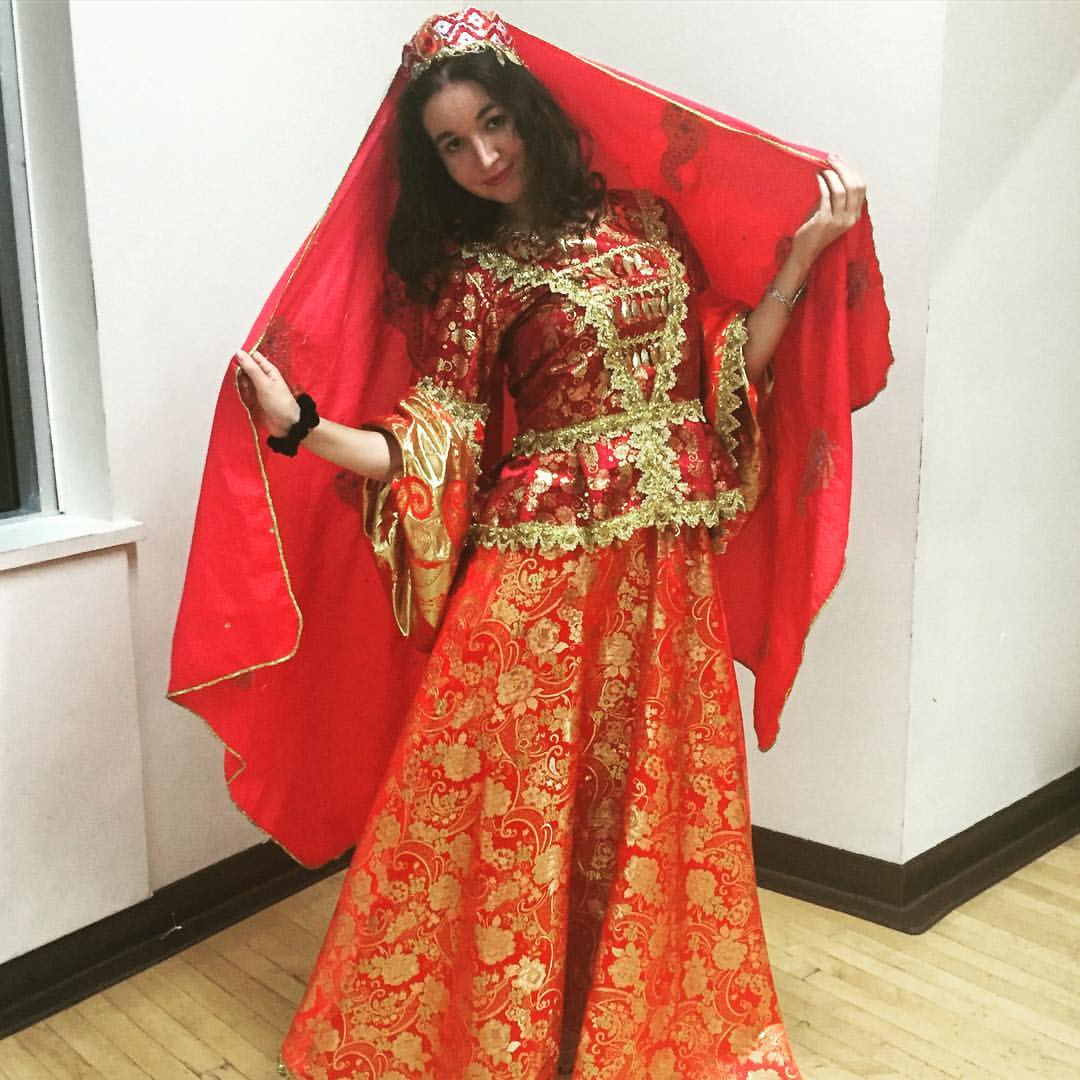Get to Know: Valeriya Nakshun
Get to know Valeriya Nakshun: speaker on Qesher about
the "Kavkazi Jews", culture writer, Community Outreach Fellow and former
dancer at Silkroad Dance Company (SRDC)

By Sylvie Hodes
I spoke to Valeriya Nakshun about her experiences as a member of the Kavkazi Jewish community, which she continues to be a strong part of even after her childhood migration to Maryland, USA.
Valeriya was born in Makhachkala, the capital of Dagestan in the Caucasus mountain range. It is home to a plethora of tribes and ethnic groups, among them an ancient Jewish community. Also known as "Mountain Jews", they are ethnically and culturally distinct from other Jewish groups in the region, descending from Persian Jews who migrated to the northern borders of the Persian empire.
Her childhood in the deeply traditional community left a strong imprint on her identity. The remoteness of the region also meant the development of a rich culture with its own unique traditions and religious practices, infused with both local and Middle Eastern elements from their neighbours. Valeriya talks fondly of the food, music and religious rituals, which reflect those of the region. For example, Kavkazi Jewish celebrations and weddings include lezginka dancing, a warrior's dance with a quick drum tempo and jewelled rice dishes encrusted with "jugh," the crispy rice that sticks to the bottom of a rice pot - known as "tahdig" in Iran. It was an interconnected, tight-knit community where everybody knew everybody.
Their language is Juhuri (Judeo-Tat), a Persian-based language with many Turkic and Hebrew elements. It is not mutually intelligible with modern Farsi spoken in Iran, Afghanistan, and Tajikistan but a Persian-speaker well-versed in the history of the language would be able to pick up on its nuances. Its curious nature as an early offshoot of Persian inspired some academics to study and document the language, and it was even written about in the Handbook of Jewish Languages.
Valeriya has many memories of her grandparents speaking and singing to her in Juhuri. The Caucasus region, being on the border between Russia and Iran , has changed hands throughout history. A project of russification was initiated under the Soviet Union, resulting in the gradual replacing of Juhuri with Russian. As the USSR expanded its power base, her grandmother switched from a Juhuri to a Russian-speaking school. Her parents were similarly educated in Soviet institutions, though they continued to speak and understand Juhuri amongst themselves.

Kavkazi Jewish Family
Valeriya tells an anecdote about the time when, once in her school in America, her teacher asked the class to bring in a list of Yiddish words from their grandparents. Unaware that the language her own grandmother spoke was not Yiddish but Juhuri, Valeriya came prepared with a long list of words she had heard her Kavkazi Jewish grandmother saying. Only upon the teacher's confusion did she realise her own background was special, distinct from the majority of Baltimore's Jews. This is a humorous example, but it demonstrates the lack of awareness about the richness and diversity of Jewish communities around the world.
For an old and religious Jewish community, the spread of the Soviet Union to the Caucasus meant drastic change. As well as attending Russian-language schools, most synagogues were shut down and religion went mostly underground. Her grandfather was active in the communist party, so after marrying formally on paper, her grandparents had to keep their religious ceremony under the chuppah a secret.
At the end of the 20th century, nearby regional conflicts and the fall of the USSR escalated the emigration of Mountain Jews, who faced particular difficulties because they were often the targets of violent antisemitic attacks, especially in Dagestan and Chechnya. So, their population gradually dwindled. Valeriya and her family were designated as refugees through the help of HIAS, an American organisation which helped Jewish refugees from the former Soviet Union emigrate. Migration happened so quickly that by the time her aunt was getting married in 1994, many of the community's Jews had left and the family couldn't find many people to invite to the wedding.
In the US, Valeriya continues to preserve Kavkazi Jewish culture, which, despite similarities to Iraqi and Persian Jewry, remains unique. Identity is extremely important to her, and she shares traditional recipes and articles with the world through online platforms. For several years, she was a company dancer for the Silk Road Dance Company, and worked with Sephardic Heritage International DC, which spreads awareness of underrepresented Jewish communities.
Kavkazi Jews are now scattered around the world, particularly in North America, Europe and Israel, though an indigenous community still exists in Azerbaijan. The internet is important in unifying Mountain Jews from around the world. In 2017, Mountain Jews were instrumental in initiating a Festival of the Caucasus in Brooklyn, New York. Museum projects, dance schools, synagogues and online forums continue to keep the community's heritage alive and vibrant.

Language map of the Caucasus
